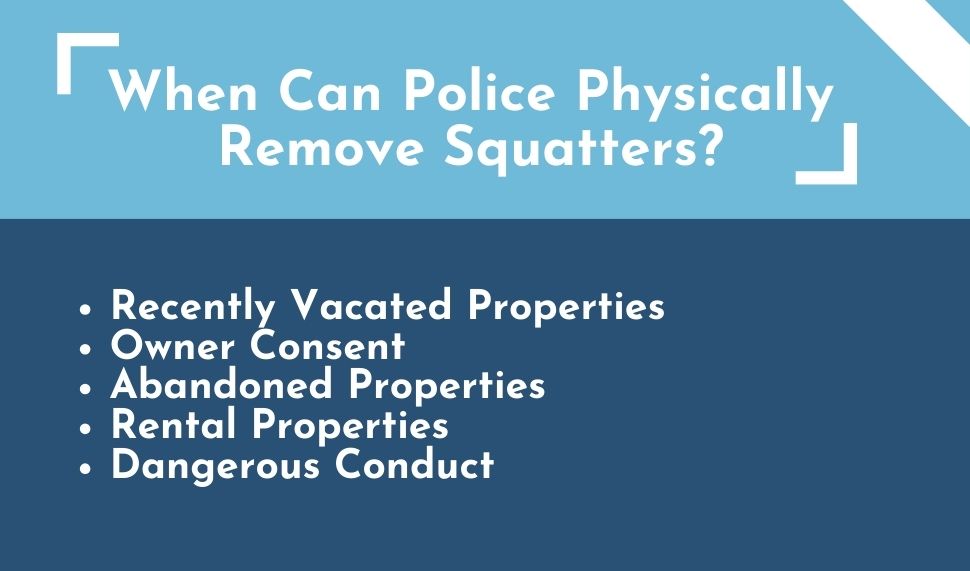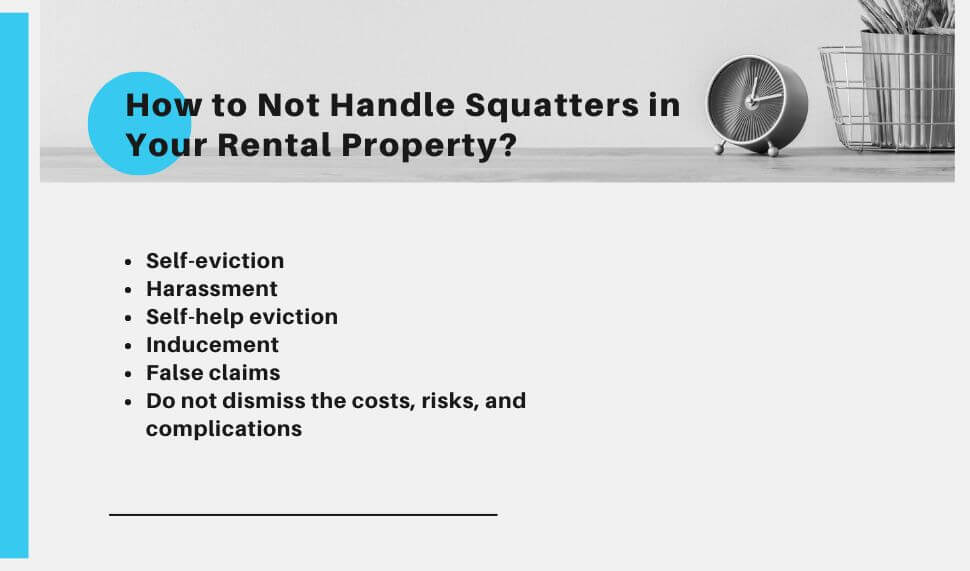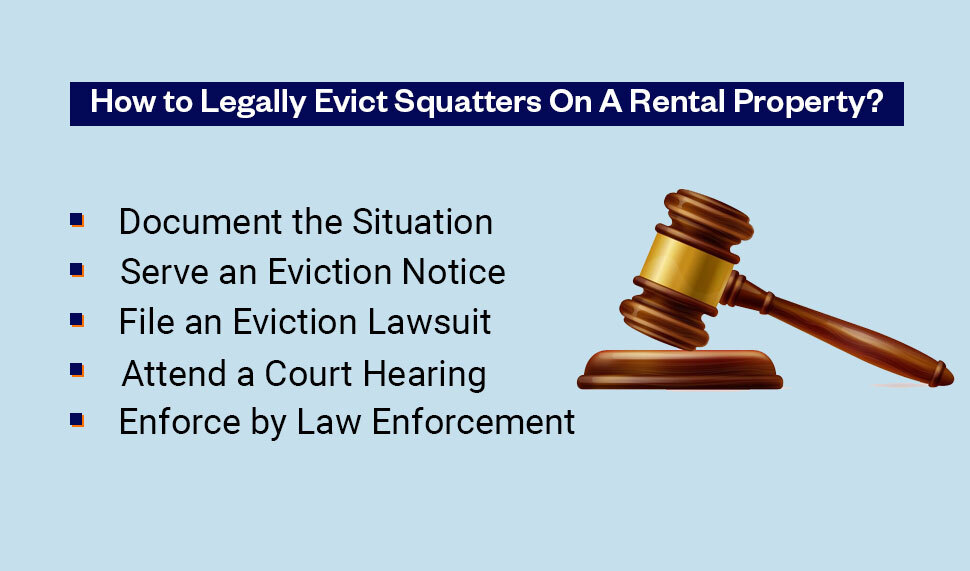Imagine walking into a property you own, only to find strangers living there. They claim they have a right to be there, but you never gave them permission. It’s a frustrating and often shocking situation. Naturally, your first instinct is to call the police and have them removed. But can police remove squatters just like that or law enforcement actually do that?
The answer? It depends.
Dealing with squatters is not only emotionally draining; it’s also legally complex. With an estimated 1 million squatters occupying vacant homes across the United States, this is a growing concern for landlords, real estate investors, and property owners alike. Many are left wondering: Do police have the authority to remove squatters? Or is the legal process more involved than it seems?
In this article, we’ll break down exactly when police can step in and when they can’t, what legal rights squatters may claim, how you can handle the situation without violating anyone’s rights or losing your property, and Oklahoma-specific updates like Senate Bill 1994 that could impact the process.
Whether you own rental property in Oklahoma or invest across multiple states, this guide will give you a clear understanding of your rights and your next steps.
Maximize Your Rental Income with Hassle-Free Property Management
Request a Service →Key Takeaways
- Police can’t always remove squatters—a court order is often required if the squatter claims tenancy.
- Trespassers may be removed by law enforcement, but squatters usually need to be evicted legally.
- Senate Bill 1994 could speed up squatter removal in Oklahoma.
- Self-help evictions are illegal—you can’t change locks or shut off utilities.
- Use “No Trespassing” signs and maintain documentation to protect your rights.
- Get help from a legal expert or property manager to handle squatter situations properly.
What Is The Legal Definition Of A Squatter?
According to the Law District – A squatter is an individual who takes over vacant or abandoned properties without the owner’s consent. They do not have legal ownership or a lease agreement with the property owner. This situation often arises due to abandoned buildings, foreclosed homes, or commercial spaces left unattended for an extended period.
What Rights Do Squatters Have?
Before entering into the question of whether the police can remove squatters, it’s important to understand the legal rights and protections squatters have in certain conditions. Over time, squatters may gain certain legal protections, which can complicate the process of removal for property owners.
Adverse Possession: In Oklahoma, if the squatter occupies the property openly and continuously for 15 years, paying property taxes and meeting all requirements, they can claim property ownership through adverse possession. This process allows squatters to make a legal claim to the property after fulfilling these conditions. The time frame can vary depending on the state. To claim legal title under Oklahoma adverse possession, the owner has two years to sort out the adverse occupation. Thus, landlords should monitor their properties regularly to avoid big losses.
Tenant Rights: Tenant Rights: Squatters can sometimes claim to be tenants if they have resided in your property for an extended period. In this case, they can have certain tenant rights that protect them from immediate eviction by the police or property owners.
Can Police Remove Squatters From Your Property?
Yes, police can remove squatters from your property with a valid court-ordered eviction. This court order gives police the legal authority to forcibly remove any squatters or unauthorized occupants, as well as their personal property, from the premises.
The police’s role is to enforce the court’s orders and ensure that the eviction occurs peacefully. They usually don’t intervene unless there is evidence of criminal activities such as trespassing, breaking, and entering. For instance, if squatters are engaged in drug trafficking or property damage, the police can take action.
In most cases, you must first file a complaint with the police if the situation escalates or the squatters refuse to leave, and then the police will take steps to remove the stubborn squatters. This process involves obtaining a court order or warrant, and in some cases, the squatters are given a notice to vacate before they are removed, as required by state and local laws. This ensures that due process is followed and protects both property rights and the rights of individuals. It is important to consider that squatters’ rights and procedures for removing them can vary depending on the state laws.
When Can Police Physically Remove Squatters?
As a property owner, you want the ability to take quick action to remove illegal occupants from your property. You prefer avoiding lengthy court eviction procedures with law enforcement, but police can physically remove squatters from a property without a court order only under certain conditions:

Recently Vacated Properties: If squatters move into a property very recently after it was vacated, police can remove them as criminal trespassers without allowing them to gain squatter’s rights. The time frame varies but is often 48-72 hours after vacancy.
Owner Consent: If the property owner provides documentation that they did not consent to the squatter being there, such as a No Trespassing order, police can be authorized to remove the squatter as a trespasser.
Abandoned Properties: For abandoned properties that pose health or safety risks, the police have the authority to remove squatters under public nuisance laws without an eviction process.
Rental Properties: If squatters move into a rental unit still under a valid lease agreement with another tenant, police can remove them as criminal trespassers since the leaseholder still maintains exclusive rights to occupancy.
Dangerous Conduct: Police officers can immediately remove squatters engaged in illegal or dangerous activities such as drug dealing, gang activity, or violence without awaiting formal eviction.
Why Might Police Decline To Remove Squatters?
There are some key reasons why police may not be able or willing to remove squatters right away forcibly:
Established Occupancy: If squatters have established residency by living at the property for an extended period, police cannot remove them until the owner completes a formal civil eviction process granting a court order for removal.
No Proof of Trespassing: If the property manager or owner cannot provide police with proper documentation such as a No-Trespassing order, lease agreement, or proof of recent vacancy, the police have no authority to treat the squatters as criminal trespassers.
Risk of Violence: Police can decline to remove squatters if there are concerns that could incite violence or cause harm to officers or the squatters themselves. They may advise seeking a civil eviction instead.
Health Risks: In some cases where the property has become extremely unsanitary, police may decline to remove squatters due to health hazards and instead direct the owner to go through a civil process.
COVID Restrictions: During the COVID-19 pandemic, some jurisdictions placed limits on law enforcement physically removing people from residences due to risks of virus transmission.
However, a new bill proposed in 2024 could soon change how squatters are handled in Oklahoma, potentially allowing sheriffs to remove them without waiting on a civil eviction.
Proposed Change: Oklahoma Senate Bill 1994 Could Empower Sheriffs
In April 2024, Oklahoma lawmakers proposed a significant change that could reshape how squatters are removed.
Senate Bill 1994 (SB 1994) – Status and Impact
- Passed by the Oklahoma House on April 17, 2024; awaiting final Senate approval.
- If enacted, it would allow county sheriffs to immediately remove alleged squatters at the property owner’s request, without requiring a court eviction.
Key Conditions Under SB 1994:
- The property owner must first ask the individual to leave.
- Exclusions apply: Current/former tenants, family members, recent occupants (within the last 12 months), or cases already involved in litigation are not eligible.
- Criminal penalties apply for damages: up to 3 years in prison or a $10,000 fine for causing damage during illegal occupancy.
Support and Criticism:
- Supporters say it gives power back to rightful owners and speeds up the removal of illegal occupants.
- Critics, including tenant advocacy groups, warn it could criminalize homelessness and may bypass due process.
If passed, this law would take immediate effect upon the governor’s signature and could drastically reduce the time it takes to regain control of your property.
How to Not Handle Squatters in Your Rental Property?
Rental property occupied by squatters is really annoying for every property owner. This hampers their business and also raises legal and ethical concerns. Property owners are not allowed to take the civil matter on by themselves. This is strictly prohibited by law. If the law is violated, it can lead to legal complications. Instead, property owners must use proper legal channels to remove squatters, such as serving eviction notices and obtaining court orders, rather than taking matters into their own hands. Taking lawful procedures protects rights and minimizes liability when evicting unauthorized occupants. Here are some things to avoid when dealing with squatters:

Self-eviction: Do not try to remove the squatters yourself without a proper eviction process. This can be dangerous, and you could be charged with trespassing or assault.
Harassment: Do not threaten or engage in harassment to scare off squatters. This can lead to legal trouble.
Self-help eviction: Do not change the locks on the property or shut off the utilities in hopes of forcing squatters out. This is considered a self-help eviction and is illegal in most jurisdictions.
Inducement: Do not offer the squatters money or other incentives to leave. This could be seen as an acknowledgement of their tenancy rights.
False claims: Do not call the police and falsely claim squatters are trespassers or burglars to get quicker enforcement help removing them.
Do not dismiss the costs, risks, and complications of removing unauthorized occupants. Professional legal guidance is a must.
Also, get aware of what constitutes an illegal eviction.
Maximize Your Rental Income with Hassle-Free Property Management
Request a Service →How to Legally Evict Squatters From Your Rental Property?
Handling squatters requires a strategic approach to avoid legal complications and property damage. Be aware of your state’s laws regarding squatters rights, as they vary widely. The eviction process is generally time-consuming and costly, and it’s the only way to get rid of squatters. In Oklahoma, squatters can have legal title to a property after living on it for 15 years. So, it is important to take action quickly after discovering squatters on your property. You can protect yourself from adverse possession claims by maintaining legal documentation and seeking legal advice.
Here is the legal process you can legally evict squatters from your rental property:
- Document the Situation
- Serve an Eviction Notice
- File an Eviction Lawsuit
- Attend a Court Hearing
- Enforce by Law Enforcement

Document the Situation: You must first document the presence of squatters, including photographs, dates, and any interactions on your property. This documentation can serve as crucial evidence when dealing with law enforcement and the legal system.
Serve an Eviction Notice: Before filing an eviction lawsuit, as a property owner, you are generally required to serve an official eviction notice to the squatters. This notice outlines the legal reasons for eviction and informs the squatters that they must vacate the premises within a specified timeframe. This period varies by jurisdiction but usually ranges from 3 to 30 days.
File an Eviction Lawsuit: If squatters refuse to leave after receiving the eviction notice, you can file an eviction lawsuit in court. This is a civil lawsuit, so you will not need to hire a criminal lawyer to regain possession of your property. Also, learn what happens if the landlord loses an eviction case.
Attend a Court Hearing: After you have filed an eviction lawsuit, you need to obtain a court order for eviction. This involves presenting the evidence of trespassing and the eviction notice served to the squatters. If the judge rules in your favor, you will be granted an eviction order.
Enforce by Law Enforcement: With a court order in hand, you can involve the police to remove squatters from your property. Law enforcement officers will enforce the court order, with lawful eviction, ensuring the property is returned to the actual owner.
How Can You Prevent Squatters?
Prevention is always better than cure. Preventing squatters from entering your property involves taking proactive measures to secure your premises. Here are some effective ways to prevent squatters from occupying your property:
- Secure All Entry Points
- Regular Inspections
- Post No Trespassing Signs
- Property Maintenance
- Install Security Systems
- Neighborhood Watch

Secure All Entry Points: Make sure all doors, windows, gates, and other entrances are secured with strong locks to make it difficult for intruders to break in.
Regular Inspections: If the property is vacant, check on the property frequently to look for signs of unauthorized entry. This action can prevent squatters from settling in.
Read more: Landlord inspection checklist for rental property
Post No Trespassing Signs: One simple but effective way to protect your vacant property is to post clear “No Trespassing” signs under Oklahoma law (Title 21 OK Stat § 21-1835). This communicates that the property is off-limits and actively monitored, even if it’s vacant. But it does more than just deter unauthorized entry; it also helps law enforcement take action when needed.
Property Maintenance: Property under non-maintenance is more likely to attract squatters, so perform regular maintenance. This gives the appearance that the property is occupied or actively monitored.
Install Security Systems: Invest in security systems like cameras and alarms to prevent potential squatters. This acts as a security concern for squatters to enter into the property.
Neighborhood Watch: Engage with your neighbors and local community to deter squatters and other criminal activities. If they are informed about the vacant property, you can get information about any suspicious activities in your property.
Related article: How to remove and avoid serial squatters?
Conclusion on police removing squatters
Now, you have to understand that dealing with squatters is a challenging and stressful experience. Although police involvement is limited without proper legal documentation and court orders, following the correct legal process is crucial for reclaiming ownership of your property and restoring peace of mind. Navigating these legalities can also be time-consuming and complex.
To ease this burden, property management companies like OKC Home Realty Services offer a valuable solution. Our team specializes in managing tenant-related issues, including thorough tenant screening, efficient rent collection, and handling eviction proceedings. By partnering with a trusted property management company, you can mitigate the stress of dealing with squatters and ensure your property is handled professionally and in compliance with the law. For expert assistance, contact OKC Home Realty Services today!
Maximize Your Rental Income with Hassle-Free Property Management
Request a Service →Can Police Remove Squatters FAQs
Can police remove squatters immediately?
Only if the squatter is clearly trespassing and has no claim of residency. If there’s any sign of a lease or occupancy, police will likely step back.
Can police remove squatters without a court order?
While police can act based on an eviction notice, in certain situations, a court order might be required for enforcement, depending on local laws.
What If Squatters Resist Eviction?
Resisting eviction is a serious matter. In such cases, law enforcement might needed to involve specialized units trained in handling situations.
Can Squatters Sue Property Owners?
Squatters can attempt to file legal claims, but their success depends on the specific circumstances and local laws.
Do Squatters Gain Ownership Over Time?
Yes, under the principle of adverse possession, squatters can potentially gain legal ownership of a property if specific legal conditions are met.
What Are the Rights of Property Owners?
Property owners have the right to protect their property from unauthorized occupation. They can pursue legal avenues, including eviction, to remove squatters.
What happens if I ignore the squatter?
They could eventually claim adverse possession. Delaying action can lead to more complications and higher legal costs.
Is changing the locks on a squatter illegal?
Yes, if they’re considered to have “residency,” you must go through formal eviction. Otherwise, you risk legal trouble.
What’s the fastest way to remove squatters legally?
Serve a 5-day notice to quit, then file an unlawful detainer. Using a local real estate attorney can speed things up.
What's the difference between a squatter and a trespasser?
A trespasser enters unlawfully, while a squatter may try to claim residency over time, which complicates removal.

Author
Scott Nachatilo is an investor, property manager and owner of OKC Home Realty Services – one of the best property management companies in Oklahoma City. His mission is to help landlords and real estate investors to manage their property in Oklahoma.
 (
(









